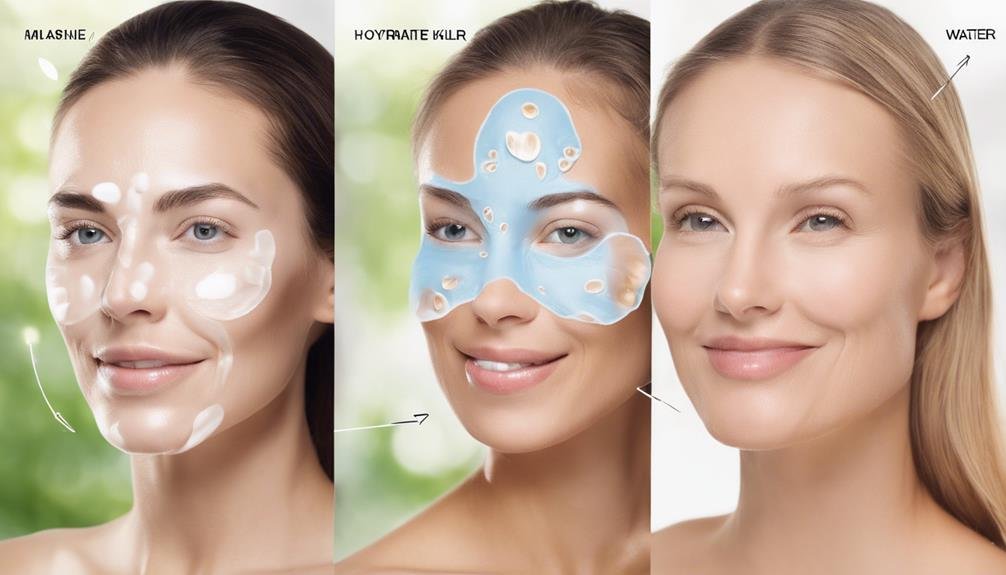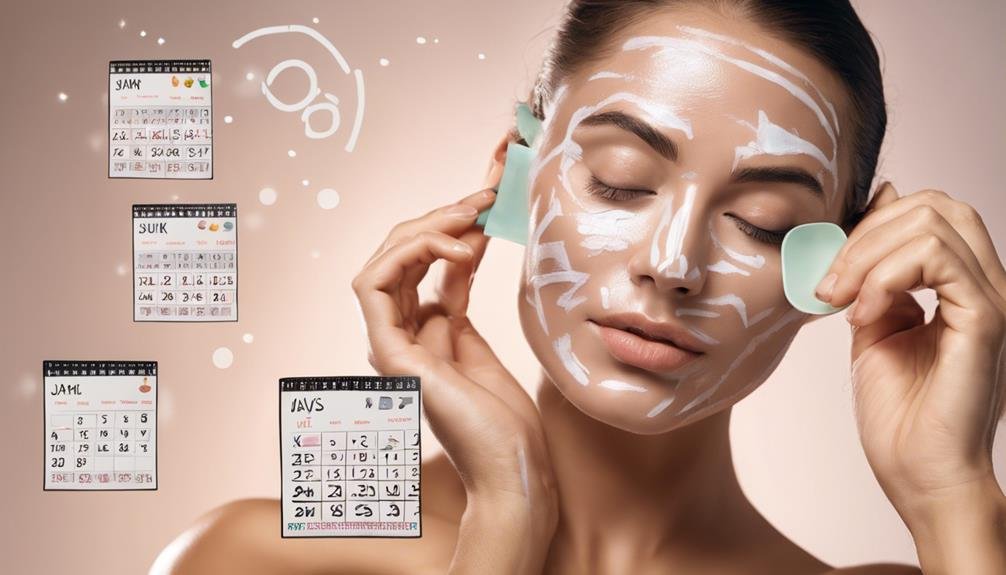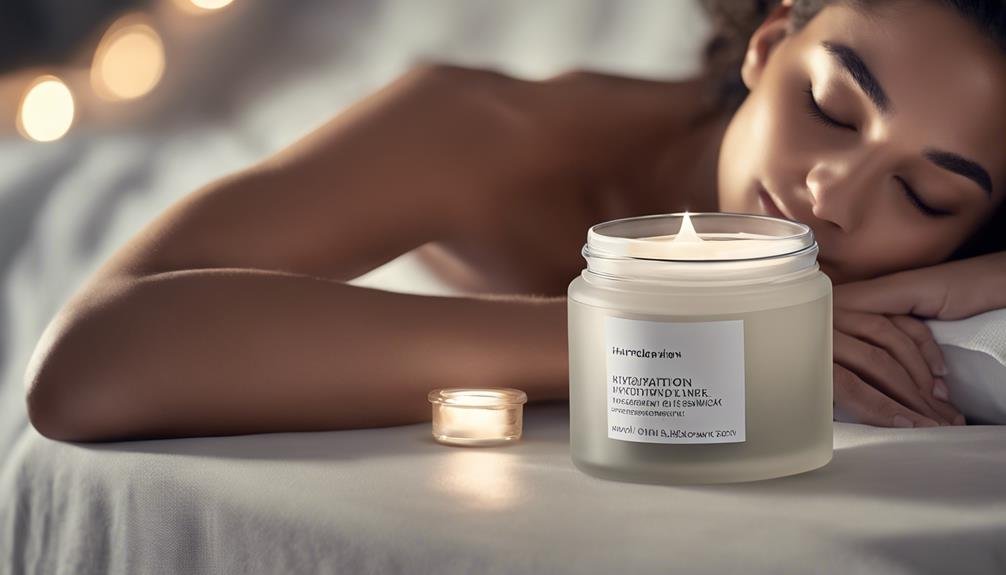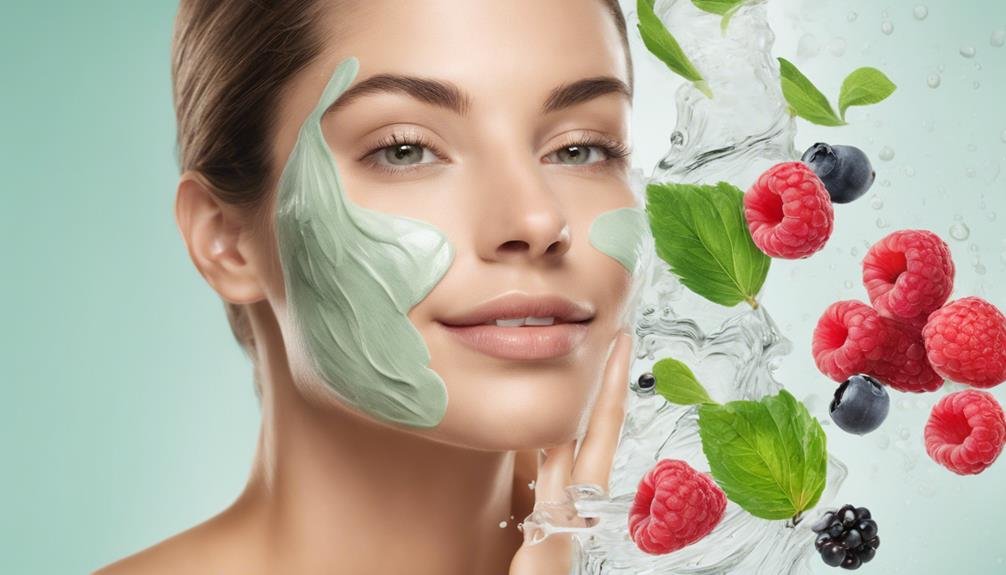Imagine your skin as a parched desert, longing for a refreshing oasis. Hydrating masks hold the key to unlocking that radiant, supple glow you've been seeking. But how exactly do these masks work their magic, and which ingredients should you look for to achieve optimal results? Stay tuned as we explore the world of hydrating masks and uncover the secrets to achieving luminous, hydrated skin that will make you feel confident and rejuvenated.
Key Takeaways
- Hydrating masks contain ingredients like hyaluronic acid and glycerin for intense moisture.
- Choose masks with antioxidants to boost collagen production and brighten skin tone.
- Look for soothing ingredients like aloe vera and chamomile for a radiant complexion.
- Masks with ceramides repair the skin barrier, enhancing elasticity and firmness.
- Consistent use 1-2 times a week for recommended duration promotes healthy, glowing skin.
Benefits of Hydrating Masks
Hydrating masks offer a plethora of benefits for your skin, making them a vital addition to your skincare routine. These masks are designed to provide intense hydration, helping to replenish moisture in your skin and restore its natural balance. By infusing the skin with moisture, hydrating masks help to improve skin elasticity, reduce the appearance of fine lines and wrinkles, and promote a more youthful, radiant complexion.
In addition to hydration, these masks often contain ingredients like hyaluronic acid, glycerin, and natural oils that can nourish and soothe the skin.
Hyaluronic acid, for example, is known for its ability to hold up to 1000 times its weight in water, making it a powerful hydrating ingredient. Glycerin helps to attract moisture to the skin, while natural oils like jojoba and argan oil provide essential nutrients and antioxidants.
Regular use of hydrating masks can help to improve the overall health and appearance of your skin, leaving it looking plump, hydrated, and glowing. Incorporating these masks into your skincare routine can help to address dryness, dullness, and signs of aging, promoting a more vibrant and youthful complexion.
Choosing the Right Ingredients
When selecting the right ingredients for your hydrating mask, it's important to consider the specific needs of your skin. Look for ingredients like hyaluronic acid, which is excellent for retaining moisture and plumping the skin. This powerhouse ingredient can hold up to 1000 times its weight in water, providing intense hydration without feeling heavy on the skin.
Another beneficial ingredient to look for is glycerin, a humectant that attracts moisture to the skin, keeping it soft and supple.
For those with sensitive skin, ingredients like aloe vera and chamomile can help soothe and calm any irritation while still providing hydration. Niacinamide is a versatile ingredient that can help improve the skin's barrier function, reducing water loss and enhancing hydration levels.
When choosing ingredients for your hydrating mask, always consider your skin type and concerns to ensure you're providing it with the nourishment it needs to achieve a healthy, glowing complexion.
How Hydrating Masks Work
To understand how hydrating masks work, it's important to recognize their key function in skincare routines. Hydrating masks are designed to provide intense moisture to the skin, helping to replenish lost hydration and improve skin's overall appearance. These masks contain ingredients like hyaluronic acid, glycerin, and ceramides, which are known for their ability to attract and retain moisture in the skin.
When applied, the hydrating mask forms a barrier on the skin's surface, preventing water loss and allowing the active ingredients to penetrate deeply into the skin. This process helps to plump up the skin, smooth out fine lines and wrinkles, and create a glowing complexion.
Additionally, hydrating masks can also improve the skin's elasticity and firmness over time with regular use.
Skin Types and Hydration Needs
Understanding your skin type and its unique hydration needs is crucial when selecting the right hydrating mask for your skincare routine. Different skin types have varying levels of hydration requirements. Dry skin often lacks natural oils and needs intense hydration to restore moisture balance. Look for hydrating masks containing ingredients like hyaluronic acid or glycerin to deeply hydrate dry skin.
On the other hand, oily skin needs hydration without adding excess oil. Opt for water-based hydrating masks with ingredients like niacinamide or hyaluronic acid to provide lightweight moisture.
Combination skin requires a balance of hydration for oily and dry areas. Seek hydrating masks with a mix of ingredients to address both concerns.
Lastly, sensitive skin needs gentle hydrating masks with soothing ingredients like aloe vera or chamomile to prevent irritation. By understanding your skin type and its hydration needs, you can choose a hydrating mask that effectively nourishes and revitalizes your skin.
DIY Hydrating Mask Recipes
Looking to pamper your skin with natural ingredients? Creating DIY hydrating masks can be a fun and effective way to nourish your skin. Below are some simple recipes using common kitchen ingredients to help you achieve a glowing complexion:
| Ingredients | Instructions | Benefits |
|---|---|---|
| Avocado & Honey | Mash ½ avocado, mix with 1 tbsp honey, apply for 15 mins, rinse. | Avocado hydrates, honey soothes and boosts elasticity. |
| Yogurt & Cucumber | Blend 2 tbsp yogurt, ¼ cucumber, apply for 20 mins, rinse. | Yogurt moisturizes, cucumber calms and refreshes skin. |
| Oatmeal & Coconut Oil | Mix 2 tbsp oatmeal, 1 tbsp coconut oil, apply for 10-15 mins, rinse with warm water. | Oatmeal exfoliates, coconut oil hydrates and softens skin. |
These masks are easy to make and offer various benefits for your skin. Remember to patch test new ingredients to ensure they suit your skin type. Enjoy these DIY treats for your skin!
Applying Hydrating Masks Correctly
Exploring the realm of DIY hydrating masks has likely sparked your interest in enhancing your skincare routine. When it comes to applying hydrating masks correctly, the process is crucial for maximizing their benefits.
Begin by cleansing your face to remove any impurities and create a clean canvas for the mask. Gently pat your skin dry with a soft towel before applying the mask evenly across your face and neck, avoiding the delicate skin around your eyes. Use a brush or your fingertips, whichever you prefer, to ensure thorough coverage.
Once applied, relax for the recommended time specified on the mask's instructions. This allows the hydrating ingredients to penetrate your skin effectively. Avoid leaving the mask on for too long, as it could potentially dry out your skin.
After the designated time, rinse off the mask with lukewarm water and follow up with your regular skincare routine. By following these steps, you can ensure that your skin reaps the full benefits of the hydrating mask, leaving you with a radiant and glowing complexion.
Frequency of Masking
To maintain healthy and glowing skin, it's essential to consider the frequency of masking in your skincare routine. Hydrating masks can work wonders for your skin, but using them too often or infrequently can impact their effectiveness. Here are some guidelines to help you determine how often you should incorporate hydrating masks into your routine:
- Skin Type: Consider your skin type when deciding how frequently to use hydrating masks. Dry skin may benefit from more frequent use, while oily skin may need less frequent application.
- Seasonal Changes: Adjust the frequency of masking based on seasonal changes. Your skin may require more hydration in drier, colder months.
- Product Instructions: Follow the recommendations provided by the product manufacturer. Some masks are designed for daily use, while others are meant for weekly application.
- Skin Response: Pay attention to how your skin responds to masking. If you notice any irritation or excessive dryness, adjust the frequency accordingly.
Hydrating Masks for Acne-Prone Skin
For those with acne-prone skin, incorporating hydrating masks into your skincare routine can be a beneficial step towards achieving a healthy complexion. While it may seem counterintuitive to use hydrating masks on oily or acne-prone skin, these masks can actually help balance oil production and provide much-needed moisture without clogging pores. Look for hydrating masks that contain ingredients like hyaluronic acid, glycerin, or aloe vera, which can hydrate the skin without exacerbating acne.
Hydrating masks for acne-prone skin work by replenishing the skin's moisture levels, which is essential for maintaining a healthy skin barrier. When the skin is well-hydrated, it's better equipped to fight off acne-causing bacteria and inflammation. Additionally, hydrating masks can help soothe any irritation or redness associated with acne breakouts, promoting faster healing and a clearer complexion.
Incorporating a hydrating mask into your skincare routine 1-2 times a week can help improve the overall health of your skin, making it more resilient to breakouts and promoting a radiant, glowing complexion.
Overnight Hydrating Mask Benefits
To maximize your skincare routine's effectiveness, consider incorporating overnight hydrating masks for their numerous benefits. Overnight hydrating masks offer a range of advantages that can help you achieve that coveted glowing skin. Here are four key benefits:
- Intense Hydration: These masks are formulated to deeply hydrate your skin while you sleep, replenishing moisture levels and leaving your skin plump and radiant in the morning.
- Enhanced Nourishment: Overnight masks often contain potent ingredients like hyaluronic acid, vitamins, and antioxidants that work overnight to nourish and revitalize your skin, promoting a healthy complexion.
- Repair and Renewal: By providing a prolonged period of contact with beneficial ingredients, overnight masks support the skin's natural repair processes, aiding in the regeneration of skin cells and promoting a smoother, more even skin tone.
- Improved Absorption: During the night, your skin is more receptive to active ingredients, making it the perfect time to use an overnight hydrating mask to enhance the absorption and effectiveness of skincare products.
Hydrating Masks for Sensitive Skin
For individuals with sensitive skin, finding the right skincare products can be a delicate balancing act. When it comes to hydrating masks, opting for gentle, soothing formulas is key. Look for masks that are fragrance-free and free of common irritants like alcohol and harsh chemicals.
Ingredients like hyaluronic acid, aloe vera, oatmeal, and chamomile are known for their calming properties and can help hydrate and nourish sensitive skin without causing irritation.
Hydrating masks for sensitive skin should focus on providing intense moisture while being gentle and non-abrasive. Consider opting for masks that are specifically labeled as suitable for sensitive skin or those that have undergone dermatological testing.
Patch-testing a small amount of the mask on a less sensitive area of your skin before using it on your face can also help prevent adverse reactions.
Antioxidants in Hydrating Masks
[TEXT]:
Sensitive skin requires special attention when it comes to skincare, and one effective way to care for it's by incorporating antioxidants into your hydrating masks. Antioxidants help protect your skin from free radicals and oxidative stress, promoting a healthy and radiant complexion. Here's why antioxidants are essential in hydrating masks:
- Fight free radicals: Antioxidants like Vitamin C and E neutralize free radicals that can damage skin cells and accelerate aging.
- Reduce inflammation: Antioxidants such as green tea extract and niacinamide have anti-inflammatory properties that soothe sensitive skin and reduce redness.
- Boost collagen production: Antioxidants like resveratrol and peptides help stimulate collagen production, improving skin elasticity and firmness.
- Brighten skin tone: Antioxidants like licorice root extract and vitamin B3 can help even out skin tone, reduce dark spots, and give your skin a luminous glow.
Hydrating Mask Recommendations
When considering hydrating mask recommendations for your skincare routine, it's crucial to select products that cater to your skin's specific needs. Look for masks containing hyaluronic acid, a powerhouse ingredient that attracts and retains moisture, plumping up your skin for a dewy glow. Brands like Laneige, Dr. Jart+, and GlamGlow offer hydrating masks with various additional benefits such as brightening, soothing, or anti-aging properties.
For sensitive skin, opt for masks with gentle ingredients like aloe vera or oat extract to prevent irritation. If you're dealing with dryness, masks enriched with ceramides can help repair your skin's natural barrier. Consider incorporating a hydrating mask into your routine 1-2 times a week, following the instructions for application time to maximize benefits.
Remember to patch test new products and consult with a dermatologist if you have specific skin concerns. By choosing hydrating masks tailored to your skin type, you can achieve a radiant complexion.
Frequently Asked Questions
Can Hydrating Masks Be Used on Other Parts of the Body?
Yes, hydrating masks can be used on other parts of the body. They provide moisture and nourishment to areas like the neck, hands, and feet. Ensure the mask ingredients are suitable for the specific skin needs of those areas.
Are Hydrating Masks Suitable for All Ages?
Yes, hydrating masks are suitable for all ages. They provide essential moisture to the skin, helping to maintain a healthy skin barrier. Regular use can benefit individuals of any age by promoting hydration and a glowing complexion.
Do Hydrating Masks Have Any Long-Term Benefits for the Skin?
When it comes to long-term benefits for your skin, hydrating masks can work wonders. Regular use can help maintain skin hydration, improve elasticity, and promote a radiant complexion. Consistency is key for seeing lasting results.
Can Hydrating Masks Help With Sunburned Skin?
Yes, hydrating masks can help with sunburned skin by providing relief, soothing inflammation, and replenishing lost moisture. They can aid in the healing process, promoting skin repair and reducing peeling. Be sure to choose masks with gentle, hydrating ingredients.
Are There Any Risks Associated With Using Hydrating Masks Too Frequently?
Overdoing hydrating masks may irritate sensitive skin, leading to redness and breakouts. Be mindful of frequency and your skin's reaction. Balance is key for healthy skin. Listen to your skin's needs for optimal results.
Conclusion
In conclusion, hydrating masks are a must-have for achieving glowing skin. These masks provide intense hydration, nourishment, and support overall skin health. By incorporating hydrating masks into your skincare routine, you can achieve a radiant complexion with improved elasticity and reduced fine lines. Remember, a hydrating mask is like a refreshing drink for your skin – it quenches your skin's thirst and leaves it glowing from within. So why wait? Start incorporating hydrating masks into your routine today for youthful, radiant skin.







